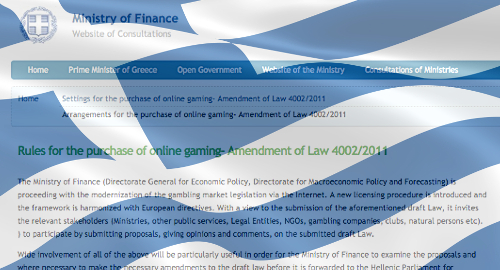 Greece’s online gambling market is finally rolling out its new licensing regime, but applicants are likely to feel a little sticker-shock.
Greece’s online gambling market is finally rolling out its new licensing regime, but applicants are likely to feel a little sticker-shock.
On Friday, Greece’s Ministry of Finance unveiled its long-delayed plans to revamp its online gambling market, allowing the 24 operators who have been operating on ‘transitional’ permits since 2011 the opportunity to apply for new licenses. But the fine print of the new licensing plan will likely disappoint many of these operators.
For starters, the new licenses will cost €4m for operators who only wish to offer sports wagering online, while the right to offer other online gambling options will cost an additional €1m. Licenses will be valid for five years, and operators must apply for renewal at least one year in advance of the license expiration, with renewal fees equal to the original license fee.
Applicants must submit a deposit of €500k and demonstrate that they hold a license to operate online in another European Union market, along with records of their previous three years of financial performance.
Applications won’t be available to any operator whose name has appeared in Greece’s online gambling blacklist in the 12 months prior to submitting their application. Among the most recent additions to the blacklist include multiple brands associated with UK-listed GVC Holdings.
It also remains to be seen whether the unresolved €187m back-tax demand submitted in January to GVC will preclude the company from either applying for or receiving a new Greek license. GVC has put aside money to cover this tax obligation, which it is challenging in court.
Applicants must base their Greek-facing operations’ servers within the country and establish accounts with locally licensed payment processing institutions. Operators must also conduct their Greek-facing business via a dot-gr domain.
The new licensing plan includes a variable tax on online gamblers’ winnings, which are to be withheld by the operator for remitting to the taxman. Winnings under €100 won’t be taxed, but winnings above €100 but less than €500 will be hit with 15% tax, while winnings above €500 will be taxed at 20%.
The government’s list of its new online rules don’t specify whether it has had a change of heart regarding its original plans to tax operators’ revenue at 35%. Given Greece’s significant unpaid debts to its international moneylenders, it seems doubtful that the government would offer operators any breaks on this point.
The Ministry has opened a consultation into its proposed online regime, and interested parties are invited to submit their proposals, opinions and comments by October 5. Applicants will learn of their acceptance within two months of filing, and the failure to learn of a positive vote will be considered a rejection of their application.
Last month, Greece’s Gaming Supervision and Control Commission revealed that total online sports betting turnover at its 24 temporary licensees hit nearly €5.3b last year, around €300m higher than the previous year. Spending at Greek-facing operators not holding a local license was reportedly worth an additional €5b.